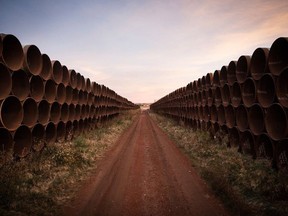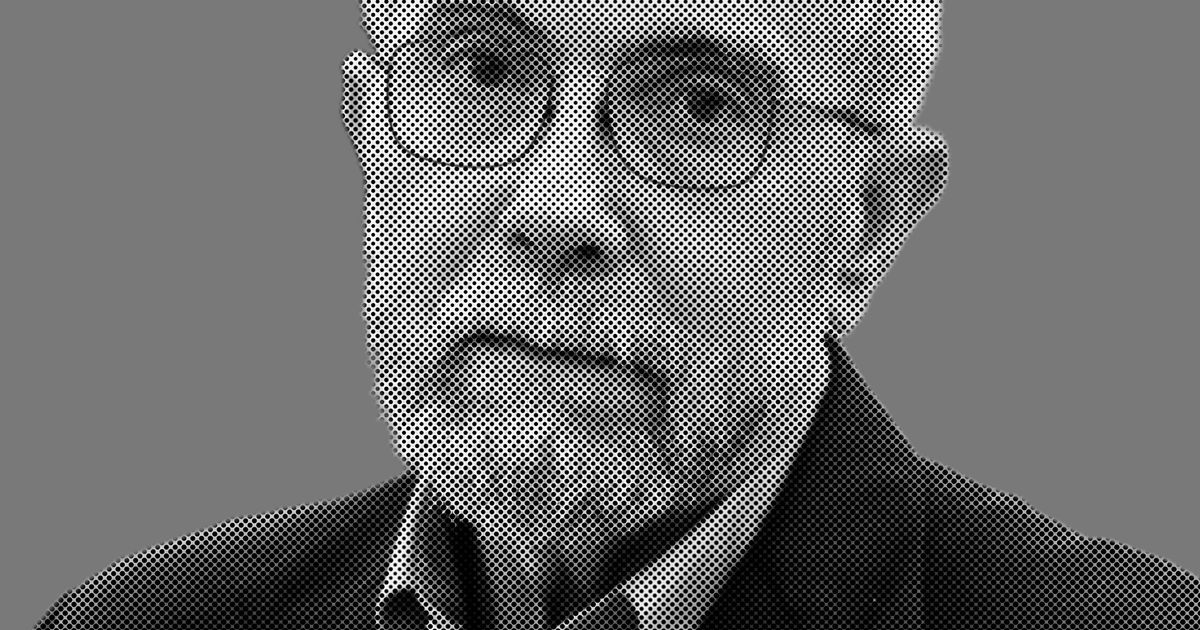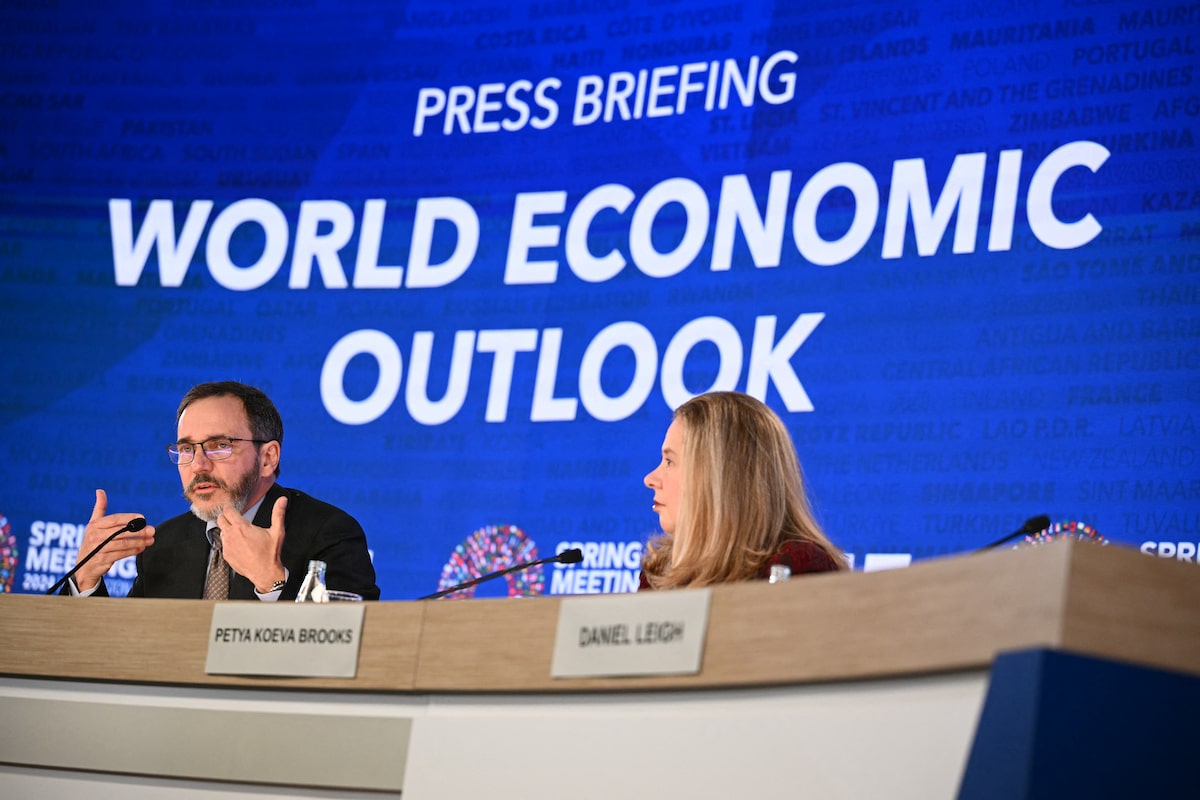Four years ago, when the election writ dropped for the 2019 campaign, Alberta’s economy was tilting on a different axis — a world before COVID-19, soaring inflation or the return of US$100-a-barrel oil.
Economy
Alberta’s economy no longer plays starring role, but still key in 2023 election
|
|


On Monday, as UCP Leader Danielle Smith and NDP Leader Rachel Notley held separate Calgary events and officially kicked off the 2023 election campaign for the May 29 vote, the provincial economy is in a vastly different place, and both parties tried to burnish their credentials while lambasting the other’s record.
“It was all about the economy in 2019. That is not the case now,” Mount Royal University political scientist Duane Bratt said Monday.
“Those economic circumstances are completely different, and that affects the politics.”
Today, the economy across Canada is rebounding from the pandemic, while rising interest rates and the rising cost of living are critical consumer concerns. Oil prices are now hovering around $75 a barrel.
The Trans Mountain project is more than 80 per cent complete — although its price tag has soared into a stratosphere at $30.9 billion — and oil output in Alberta averaged record levels of production at 3.7 million barrels per day (bpd) last year.
However, Keystone XL is long since dead and buried, costing the Alberta government an estimated $1.3 billion after its investment was lost when the project was nixed by U.S. President Joe Biden.

After a robust 2022, Alberta’s economy continues to expand, although it’s expected to slow down this year to 2.1 per cent growth, followed by 2.8 per cent in 2024, the Conference Board of Canada forecasts.
“In our underlying forecast, we do see Alberta as kind of the stronghold for Canada in the next year,” said Pedro Antunes, the board’s chief economist.
“That’s, in large part, because Alberta is still really recovering from what has been a long, drawn out, almost recessionary period.”
But energy sector investment has gone up and drilling activity was strong during the winter months.
Another key economic force in the province today is the strong level of population growth, fuelled by rising immigration and interprovincial migration over the past year, said Alberta Central chief economist Charles St-Arnaud.
Alberta added more than 45,000 people in the final three months of last year, with a net increase of more than 29,000 new residents from international migration, and 11,000 people moving from other provinces.
“The fact our population is growing by about three per cent year over year is putting a lot of momentum into our growth,” he said.
“That has a spillover on the rest of the economy.”
However, wage growth has lagged the rest of the country recently, St-Arnaud noted.
The province’s unemployment rate stood at 5.7 per cent in March, down a half-a-percentage point from a year earlier, but it’s still above the national rate of five per cent.
With new investments expected to flow into promising areas such as hydrogen, carbon capture projects and agricultural technology, companies need to fill open positions — and there’s a need for the province to invest in post-secondary institutions and re-skilling workers, said Adam Legge, president of the Business Council of Alberta.
“People and talent and skills are the No. 1 issue for our members and most companies I talk to,” he said.
“We have shortages now and we will have even more shortages if we’re trying to make (these) significant investments.”
On the opening day of the 2023 election, economic and pocketbook issues did surface on the campaign trail. Smith announced the UCP will create a new eight per cent income tax bracket — beginning next year — on income earned under $60,000 annually, with people making above that rate saving up to $760 a year.
Those earning less will see a 20 per cent cut to their provincial taxes.
“We have done an incredible amount of work over the last four years to rebuild confidence in our Alberta economy and it’s working,” Smith told reporters.
“With an NDP government, Albertans will see real action to grow and diversify our economy,” she said. “Diversification is an absolute necessity.”
The state of the economy may not play the same starring role as it did four years ago. Yet, given the importance of attracting investment and creating jobs for the future, it will remain a key campaign issue over the next four weeks.
Chris Varcoe is a Calgary Herald columnist.





Economy
Paul Krugman Is Right About the Economy, and the Polls Are Wrong – New York Magazine


One of the most uncomfortable arguments to make in America is that the people are wrong. It’s especially uncomfortable when the subject is something you experience in a more comfortable, privileged way than most people. And so when liberal economic elites insist the economy, which opinion polls consistently find the public considers terrible, is actually very good, it makes liberal economic elites come off badly.
Paul Krugman is one of those dreaded liberal elitists who believes the economy is actually good. So (at a much lower level of confidence and frequency) am I. We have developed a number of explanations for why people believe an economy that The Wall Street Journal recently called “the envy of the world” is so awful.
The most generous of these accounts is that people consider higher wages something they earned and higher inflation something that happened to them. But all the explanations involve conceding some level of basic irrationality on the part of the public. And the attempts to make sense of public assessments of the economy seem deeply unconvincing.
Biden’s low economic ratings are “not hard to grasp,” argues Robert Kuttner in the left-wing American Prospect, “None of the recent improvements have altered the basic situation of most Americans, in which reliable careers are scarce, college requires the burden of debt, health coverage is more expensive and less reliable, and housing is unaffordable.” The solution, Kuttner argues, is for Biden to implement “radical” economic reforms along the lines of those promised by Bernie Sanders in 2016.
Kuttner’s hypothesis fails to explain why Americans were thrilled by economic conditions as recently as 2019, when the same basic features of the economy remained in place. Indeed, it fails to explain why Americans have ever considered the economy to be healthy, given that Bernie-style social democracy has, famously, never been tried in the United States.
Michael Powell, writing in the Atlantic, flays liberals in general, and Paul Krugman in particular, along lines similar to Kuttner’s:
The modern Democratic Party, and liberalism itself, is to a substantial extent a bastion of college-educated, upper-middle-class professionals, people for whom Biden-era inflation is unpleasant but rarely calamitous. Poor, working-class, and lower-middle-class people experience a different reality. They carry the searing memories of the Great Recession and its foreclosure crisis, when millions of American households lost their home. A large number of these Americans worked in person during the dolorous early days of the pandemic, and saw its toll up close. And since 2019, they’ve weathered 20 percent inflation and now rising interest rates—which means they’ve lost more than a fifth of their purchasing power. Tell these Americans that the economy is humming, that median wage growth has nudged ahead of the core inflation rate, and that everything’s grand, and you’re likely to see a roll of the eyes.
Powell makes several claims here, all of them deeply flawed.
He argues the working class considers the economy terrible because of “searing memories” of the Great Recession and then the pandemic. Yet, like Kuttner, he fails to explain why these same voters considered Trump’s economy to be so splendid. Memories of the Great Recession and its aftermath were fresher under Trump than they are now. And the worst and deadliest period of the pandemic actually occurred under Trump, which makes the current nostalgia for Trump’s economy all the more incompatible with Powell’s hypothesis.
It is true, as he writes, that prices have risen 20 percent since 2019. But that doesn’t mean people have “lost more than a fifth of their purchasing power.” Purchasing power is a function of the relationship between what things cost and how much you have to spend. Wages have been rising faster than inflation since last year, and the average American is better off than before the pandemic.
What’s more, contrary to Powell’s argument that the working class has suffered under Biden’s inflationary economy, wages have grown much faster at the bottom than at the top.
Powell reasons that public opinion is essentially dispositive. If the people feel the economy is bad, then it’s bad, regardless of what economists like Krugman tell them. “Working- and middle-class Americans,” he argues, “are wiser to trust their feelings and checking accounts than to rely on liberal economists.”
The trouble here is that polling finds plenty of public optimism about the economy in contexts other than asking people how the American economy is doing. An Axios poll earlier this year found 63 percent of Americans rate their personal financial situation as “good,” a figure in line with historical levels. That is also reflected in people’s spending practices — they are behaving as though the economy were booming, even if they don’t think it is.
A Wall Street Journal poll last month of seven swing states found a gigantic disconnect between the public’s view of economic conditions in their own state and in the country as a whole. Fifty-four percent of respondents believe economic conditions in their state are excellent or good. But only 36 percent of respondents said the same of economic conditions in the country.
Now this was a poll of seven swing states, not the entire country. I suppose you could imagine the swing states are in dramatically better economic shape than the rest of America, though if that were true, you’d expect Biden to be polling a little better.
What this suggests to me is that public assessment of the economy reflects something other than an objective assessment of economic conditions. People think they are doing well and their state is doing well but the country is doing horribly. Must we assume some deep wisdom underlies these seemingly irreconcilable beliefs? Sometimes people, even with the benefit of close personal experience, just believe things that aren’t true.
Economy
Outlook for global economy is brighter, though still modest by historical standards: IMF – The Globe and Mail


IMF Chief Economist Pierre-Olivier Gourinchas and IMF Research Department Deputy Director Petya Koeva Brooks hold a news briefing at IMF headquarters, in Washington, on April 16.MANDEL NGAN/Getty Images
The International Monetary Fund has upgraded its outlook for the global economy this year, saying the world appears headed for a “soft landing” – reining in inflation without much economic pain and producing steady if modest growth.
The IMF now envisions 3.2 per cent worldwide expansion this year, up a tick from the 3.1 per cent it had predicted in January and matching 2023′s pace. And it foresees a third straight year of 3.2 per cent growth in 2025.
In its latest outlook, the IMF, a 190-country lending organization, notes that the global expansion is being powered by unexpectedly strong growth in the United States, the world’s largest economy. The IMF expects the U.S. economy to grow 2.7 per cent this year, an upgrade from the 2.1 per cent it had predicted in January and faster than a solid 2.5 per cent expansion in 2023.
Though sharp price increases remain an obstacle across the world, the IMF foresees global inflation tumbling from 6.8 per cent last year to 5.9 per cent in 2024 and 4.5 per cent next year. In the world’s advanced economies alone, the organization envisions inflation falling from 4.6 per cent in 2023 to 2.6 per cent this year and 2 per cent in 2025, brought down by the effects of higher interest rates.
The Federal Reserve, the Bank of Japan, the European Central Bank and the Bank of England have all sharply raised rates with the aim of slowing inflation to around 2 per cent. In the United States, year-over-year inflation has plummeted from a peak of 9.1 per cent in the summer of 2022 to 3.5 per cent. Still, U.S. inflation remains persistently above the Fed’s target level, which will likely delay any rate cuts by the U.S. central bank.
Globally, higher borrowing rates had been widely expected to cause severe economic pain – even a recession – including in the United States. But it hasn’t happened. Growth and hiring have endured even as inflation has decelerated.
“Despite many gloomy predictions, the global economy has held steady, and inflation has been returning to target,” Pierre-Olivier Gourinchas, the IMF’s chief economist, told reporters ahead the release of the fund’s latest World Economic Outlook.
Though the world economy is showing unexpected resilience, it isn’t exactly strong. From 2000 through 2019, global economic growth had averaged 3.8 per cent – much higher than the 3.2 per cent IMF forecasts for this year and next. Keeping a lid on the world’s growth prospects are the continued high interest rates, along with sluggish gains in productivity in much of the world and the withdrawal of government economic aid that was rolled out during the pandemic.
The IMF warns that the economic expansion could be thrown off by the continuing adverse effects of higher rates and by geopolitical tensions, including the war in Gaza, that risk disrupting trade and raising energy and other prices.
China, the world’s No. 2 economy, has been struggling with the collapse of its real estate market, depressed consumer and business confidence and rising trade tensions with other major nations. The IMF expects the Chinese economy, which once regularly generated double-digit annual growth, to slow from 5.2 per cent in 2023 to 4.6 per cent in 2024 to 4.1 per cent next year.
But on Tuesday, Beijing reported that China’s economy expanded at a faster-than-expected pace in the first three months of the year, fueled by policies that are intended to stimulate growth and stronger demand. The Chinese economy expanded at a 5.3 per cent annual pace in January-March, surpassing analysts’ forecasts of about 4.8 per cent, official data show. Compared with the previous quarter, the economy grew 1.6 per cent.
Japan’s economy, the world’s fourth-largest, having lost the No. 3 spot to Germany last year, is expected to slow from 1.9 per cent last year to 0.9 per cent in 2024.
Among the 20 countries that use the euro currency, the IMF expects growth of just 0.8 per cent this year – weak but double the eurozone’s 2023 expansion. The United Kingdom is expected to make slow economic progress, with growth rising from 0.1 per cent last year to 0.5 per cent in 2024 and 1.5 per cent next year.
In the developing world, India is expected to continue outgrowing China, though the expansion in the world’s fifth-largest economy will slow, from 7.8 per cent last year to 6.8 per cent this year and 6.5 per cent in 2025.
The IMF foresees a steady but slow acceleration of growth in sub-Saharan Africa – from 3.4 per cent last year to 3.8 per cent in 2024 to 4.1 per cent next year.
In Latin America, the economies of Brazil and Mexico are expected to decelerate through 2025. Brazil is likely to be hobbled by interest high rates and Mexico by government budget cuts.
Economy
China economy grows faster than expected in first quarter – BBC.com


China’s economy made a stronger-than-expected start to the year, even as the crisis in its property sector deepened.
According to official data, gross domestic product (GDP) expanded by 5.3% in the first three months of 2024, compared to a year earlier.
That beat expectations the world’s second largest economy could see growth slow to 4.6% in the first quarter.
Last month, Beijing set an ambitious annual growth target for world’s second largest economy of “around 5%”.
Data from the National Bureau of Statistics (NBS) also showed first quarter retail sales growth, a key gauge of China’s consumer confidence, fell to 3.1%.
“You cannot manufacture growth forever so we really need to see households come to the party if China wants to hit that around 5% growth target,” Harry Murphy Cruise from Moody’s Analytics told the BBC.
In the same period property investment fell 9.5%, highlighting the challenges faced by China’s real estate firms.
The figures came as China continues to struggle with an ongoing property market crisis. According to the International Monetary Fund (IMF), the sector accounts for around 20% of the economy.
The latest data also showed new home prices fell at the fastest pace for more than eight years in March.
The real estate industry crisis has been highlighted in January when property giant Evergrande was ordered to liquidate by a court in Hong Kong.
Rival developers Country Garden and Shimao have also been hit with a winding-up petitions in the city.
Last week, credit ratings agency Fitch cut its outlook for China, citing increasing risks to the country’s finances as it faces economic challenges.
At the annual gathering of China’s leaders in March officials said the economy grew by 5.2% in 2023.
For decades the Chinese economy expanded at a stellar rate, with official figures putting its GDP growing at an average of close to 10% a year.
-
Media20 hours ago
Trump Media plunges amid plan to issue more shares. It's lost $7 billion in value since its peak. – CBS News
-
Real eState23 hours ago
Real estate mogul concerned how Americans will deal with squatters: ‘Something really bad is going to happen’ – Fox Business
-



 Tech24 hours ago
Tech24 hours agoJava News Roundup: JobRunr 7.0, Introducing the Commonhaus Foundation, Payara Platform, Devnexus – InfoQ.com
-



 Sports23 hours ago
Sports23 hours agoRafael Nadal confirms he’s ready for Barcelona: ‘I’m going to give my all’ – ATP Tour
-
Science23 hours ago
Total solar eclipse: Continent watches in wonder – Yahoo News Canada
-



 Investment20 hours ago
Investment20 hours agoLatest investment in private health care in P.E.I. raising concerns – CBC.ca
-
Media23 hours ago
Meta's news ban changed how people share political info — for the worse, studies show – CBC.ca
-



 Politics22 hours ago
Politics22 hours agoQuebec employers group urges governments to base immigration on labour needs, not politics – CityNews Montreal



